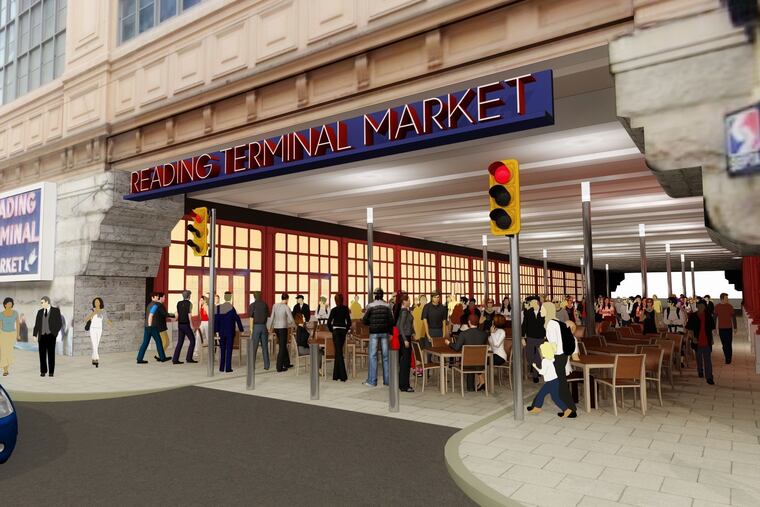Outside Philly’s Reading Terminal Market, a pedestrian plaza to come to Filbert Street
The $1 million initiative will create 15,000 square feet of public space adjacent to the market. The redesign will include retractable bollards, which, when not used, will allow for vehicle traffic.

The 1100 block of Filbert Street outside Reading Terminal Market will soon be transformed into a part-time pedestrian plaza, allowing for the canopy-covered block to be used occasionally as public space.
The $1 million project, dubbed the Filbert Street Transformation Project, will create nearly 15,000 square feet of public space next to the market, allowing for outdoor dining, pop-up retail kiosks, and art installations. The plaza’s perimeter will be lined with retractable poles that, when activated, will close the street to vehicle traffic. Otherwise, drivers will still be able to pass through the block, which stretches from 11th to 12th Street.
The plaza initiative, expected to be completed by spring or early summer of 2020, joins a growing list of public spaces that have been revamped in recent years, including Spruce Street Harbor Park along the Delaware River and the Reading Viaduct, the previously overgrown and abandoned rail park that has been partially transformed into public green space.
Still, other cities have taken “pedestrian-friendly” further, with places such as New York City and Los Angeles turning some popular roadways into permanent public plazas. Paris last year went so far as to ban all cars in its city center on the first Sunday every month in an effort to tackle air pollution and ease the way for walkers. Since Pope Francis’ visit to Philadelphia in 2015, the city has experimented with making some areas car-free. On Aug. 3, the initiative will return for the fourth time to North Broad Street, closing a stretch of asphalt between City Hall and Erie Avenue from 8 a.m. to 1 p.m.
The bulk of the Filbert Street Transformation Project, Philadelphia and Reading Terminal Market officials said this week, will include renovations to the streetscape, including widening the sidewalk and removing the curbs — both of which will add more public space even when cars are still allowed. The Filbert Street parking lane will be removed, and the sidewalks will be widened by approximately six feet. Officials said that a portion of the redone sidewalk will be dedicated to passenger loading. A ride-share-designated pickup zone will be constructed.
Anuj Gupta, Reading Terminal’s general manager, said that extending the sidewalk would allow for increased outdoor dining for the nearly seven million people who each year visit Reading Terminal — one of the country’s oldest and largest public markets. The wider sidewalk also will be used for public art, Gupta said. The first permanent art installation will be a set of Reading Co. replica train-car sculptures by local artist Jason Roberts, which will also double as furniture. Through a partnership with Mural Arts Philadelphia, a public mural is being installed in SEPTA’s Jefferson Station vestibule near the market.
“[We can] have space for musicians without closing the street,” Gupta said Friday. “Expanding the sidewalk will give us more capacity.”
He said he “doesn’t anticipate” that closing down the entire block will be a “regular occurrence,” though it will happen for various events and programs.
“It is difficult on a daily basis to close the street down,” Gupta said. “The way I see it is, we’ve got enough real estate to create space for pop-up places.”
Kiosks will be available to local artists and entrepreneurs. The street furniture and kiosks were designed by one of Reading Terminal’s Pennsylvania Dutch vendors, Dienner’s Bar-B-Q Chicken. The owner’s brother, Austin Dienner, makes furniture.
Gupta said some of the kiosks will start Saturday, with two organizations, CraftNOW and the Welcoming Center for New Pennsylvanians, occupying carts. CratfNOW is a nonprofit organization that showcases local craft artists. The Welcoming Center for New Pennsylvanians gives immigrants in the Philadelphia region access to job opportunities.
The project is funded by a $400,000 grant from the state’s Multimodal Transportation Fund, as well as two $250,000 grants from the William Penn Foundation and the Knight Foundation.